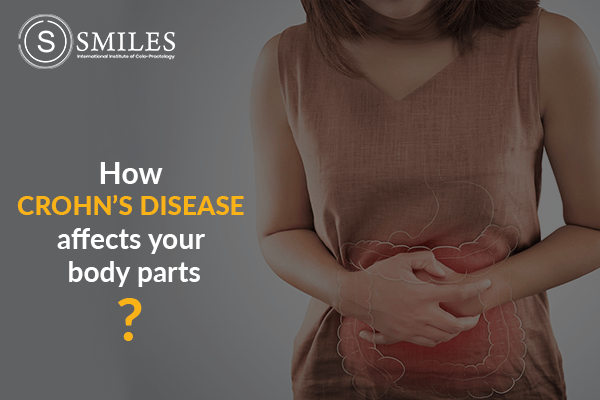You might have heard of Crohn’s disease, but we are sure you are not familiar with what it is exactly and how it affects us. Crohn’s disease is a type of Inflammatory Bowel Disease (IBD) that causes inflammation of your digestive tract which can lead to abdominal pain, severe diarrhea, anemia, fatigue, and weight loss.
Some people may be symptom-free for most of their lives while others can have severe Crohn’s symptoms that never go away and cause life-threatening complications.
The exact cause of Crohn’s is unknown. But you may get Crohns when your body’s immune system has an abnormal inflammation response to normal bacteria in your intestines, says the experts of gastroenterology at SMILES.
Crohn’s disease can affect other parts of your digestive tract but the ileum, the lower part of the small intestine is most commonly affected.
How Crohn’s disease affects your body parts?
The inflammation caused by Crohns disease can spread to different parts of the body in different people. As explained by Dr. Prasad, the best gastroenterologist, here are some of your body parts that Crohn’s can affect.
Small and Large Intestine
People believe that it is the only small intestine that gets affected, but the specialists of gastroenterology explain that the large intestine is also commonly affected in Crohn’s disease.
The most common type of Crohn’s disease, ileocolitis causes inflammation at the end of the small intestine (the ileum) and the large intestine (the colon). And the Crohn’s ileitis is a form of Crohn’s disease that affects only your ileum and Crohn’s colitis affects only your colon.
The Esophagus
Crohn’s disease in the esophagus (part of the digestive tract that connects the mouth and the stomach) is very rare and estimated to affect about 1% of patients. The symptoms of Crohns in the esophagus can lead to the problem of trouble or painful swallowing and cause heartburn.
If you suspect Crohn’s in the esophagus, opt for an upper endoscopy to look for inflammation or other complications such as fistulas or strictures in the esophagus.
The Stomach
In about 10% of patients with symptoms of Crohn’s , the stomach may be affected. The two different types of Crohn’s diseases that affect your stomach are jejunoileitis and gastroduodenal Crohn’s disease.
Jejunoileitis is a form of crohns which causes inflammation in the middle part of your small intestine (jejunum) and gastroduodenal Crohn’s disease is a form of Crohn’s which affects the esophagus, stomach, and duodenum(the first part of the small intestine).
The Mouth
Although the location of inflammation is intestinal tract people with Ulcerative colitis and Crohn’s disease tend to have mouth ulcers known as canker sores. These ulcers develop around the base of your gums and they vary from other mouth lesions such as herpes, which appears on the lips.
You may also experience various other problems in the mouth such as inflammation inside the mouth or on the tongue. Sometimes malnutrition and medications to treat Crohn’s disease interfere with mouth bacteria and then cause mouth ulcers.
The Perianal Area
Crohn’s disease is quite common in affecting your perianal area, the area around the anus. Some of the anorectal problems that can occur include perianal abscesses, fistulas, anal fissures, and hemorrhoids. An abscess is a collection of blood and pus, and most of the people with Crohn’s may develop abscess during the disease.
This abscess can further develop fistulas, an abnormal opening between two organs and anal fissures, a small tear in the anal canal which could also affect people with Crohn’s.
Having Crohn’s disease that causes inflammation to your colon increases your risk of colon cancer. Hence it is important to treat the disease right away. Do not ignore if your symptoms of Crohn’s are persistent or getting worse, consult the best gastroenterologist in Bangalore to manage your disease.

